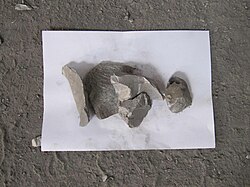This article needs additional citations for verification. (September 2023) |
Ferrotitanium is a ferroalloy, an alloy of iron and titanium with between 10 and 20% iron and 45–75% titanium and sometimes a small amount of carbon. It is used in steelmaking as a cleansing agent for iron and steel; the titanium is highly reactive with sulfur, carbon, oxygen, and nitrogen, forming insoluble compounds and sequestering them in slag, and is therefore used for deoxidizing, and sometimes for desulfurization and denitrogenation. In steelmaking, the addition of titanium yields metal with finer grain structure. Ferrotitanium can be manufactured by mixing titanium sponge and scrap with iron and melting them together in an induction furnace.[1] Ferrotitanium powder can be also used as a fuel in some pyrotechnic compositions.

References
edit- ^ Rudolf Fichte. "Ferroalloys". Ullmann's Encyclopedia of Industrial Chemistry. Weinheim: Wiley-VCH. doi:10.1002/14356007.a10_305. ISBN 978-3527306732.
External links
edit- Jorgenson, John D.; Corathers, Lisa A.; Gambogi, Joseph; Kuck, Peter H.; Magyar, Michael J.; Papp, John F.; Shedd, Kim B. "Minerals Yearbook 2006: Ferroalloys" (PDF). United States Geological Survey. Retrieved 2009-04-24.
- TiVolga - ferrotitanium in lumps, fines, cored wire with ferrotitanium filling
- Sumitomo Titanium Corporation - ferrotitaniums QFT-70, QFT-40, QFT-28
- F.E. Mottram Group